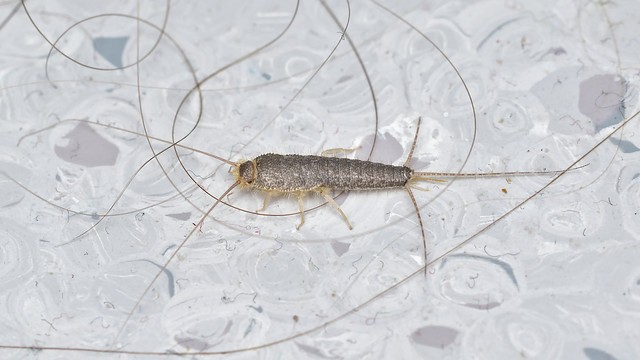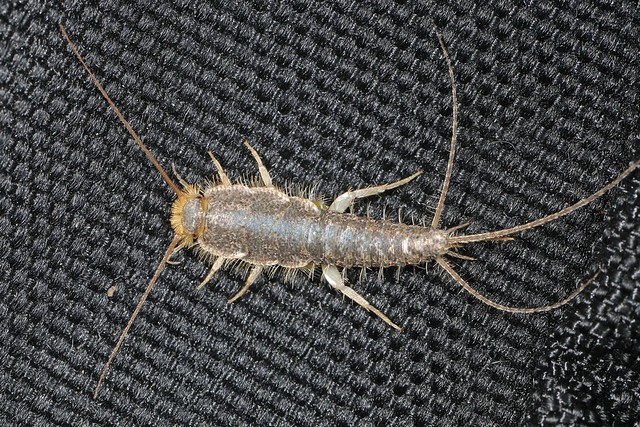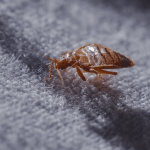Do Silverfish Really Bite?
One of the biggest fears people have when they have some sort of a pest infestation is whether they are in danger of becoming bite victims. So if you have a silverfish invasion in your home, it’s completely normal to wonder whether your family and pets are at some sort of risk. In this article, we will take a look at the silverfish’s eating habits, how likely are they to attack a person or a pet, what are the bite symptoms and the possible allergic reactions.
Do silverfish actually bite humans and pets?
First and foremost, we should let you know that it’s very rare for these creatures to actually bite or attack a human or a pet. As soon as silverfish notice they are in danger, they will instantly try to hide in a safe place, away from humans. They are mostly active during the night while in the daytime, they stay out of sight in very small cracks and crevices that are out of our reach.
Silverfish don’t even like feeding on human blood, so if you do get bitten it’s probably by accident. These insects prefer feeding on sugary and starchy foods because of the carbohydrates they contain. Another reason for this is that their mandible is quite fragile and they can only chew soft food and remove dead skin cells.
Unlike with other insects, for example, bed bugs, you cannot tell there is an infestation just by discovering bite marks. Silverfish build their nests close to the food source they have found, so there is no need for them to travel far and they are rarely seen by humans.
In summary, it’s very unlikely to get bitten but it’s not impossible. If you get to this point it probably means that the infestation is getting out of hand and you will need to call an expert to treat the property.
Read more: 12 Most Interesting Pest-related Questions with Answers
Having silverfish in your your property?
Benefit from professional pest control service with high quality!
Call usWhat are the silverfish bite symptoms?
Before we get into the actual symptoms, let’s take a look at how severe is the silverfish bite pain and the treatment that can take care of it. Regarding pain, you might feel the bite itself once and after that is just itchiness that doesn’t last long. Serious medical treatment must be considered if you have allergies and if the symptoms do not disappear after a day or two. You can get affected by silverfish not only through a bite but if you inhale a shed of their exoskeleton.
Now, let’s take a look at the most common silverfish bite symptoms:
- Itchiness that doesn’t last for more than a day
- Sharp pain that is similar to an ant bite.
- Red sequential marks on the skin (note that they might be caused even by contact with the insect, a bite is not necessary)
- Nose inflammation
All of these symptoms rarely last for more than one or two days. However, for people with allergies, it’s a little bit different.
Let’s take a look at...
What allergic reactions do silverfish bites cause?
Silverfish are dangerous to people, and in the rare case - animals, that have a specific allergy to this insect. The reactions include rhinitis, nose inflammation and respiratory problems. Keep in mind that people with respiratory allergies, especially kids, are more likely to be affected by the silverfish bite. The allergen that is causing these reactions is called Tropomyosin and it’s often found in shrimps and shellfish. If you or any of your family members have shown signs of an allergic reaction, take care of the silverfish infestation immediately by calling a pest control specialist.
How to prevent silverfish bites?
The most obvious and effective way, of course, is to prevent a silverfish infestation from happening in the first place. Here are some tips that will help you escape from a possible silverfish invasion in the future:
- Silverfish feed on dust mites, so in order to limit their food source, regularly vacuum your home and dust thoroughly all surfaces.
- Silverfish also eat practically all types of food, especially the ones high in cellulose. Make sure that all of your food is properly stored in sealed containers and there are no leftovers on the counters, the floor, and other visible areas.
- Piled up cardboard boxes and clothing are the perfect home for silverfish so throw away everything that can be thrown or put it in a secure place with good ventilation.
- Make sure that the level of humidity stays low inside the rooms of your home. Even if you think you are safe from silverfish, high levels of humidity can actually cause a lot of health problems so it’s always a good idea to keep them low. You can always buy a dehumidifier to speed up the process. Read more: How to get rid of silverfish?
Takeaways
- It’s very important not to let an invasion go out of control, even if there is no danger of an allergic reaction.
- Maintain your property clean so you don’t gather dust mites, which are silverfish’s favourite meal.
- If you think the infestation is getting more serious and you don’t want to risk your family’s health, trust the experienced silverfish specialists of Fantastic Pest Control to save your property.
Noticed silverfish in your home?
We share helpful information according to the experience and know-how of the pest technicians. However, we don't provide any medical advice.










